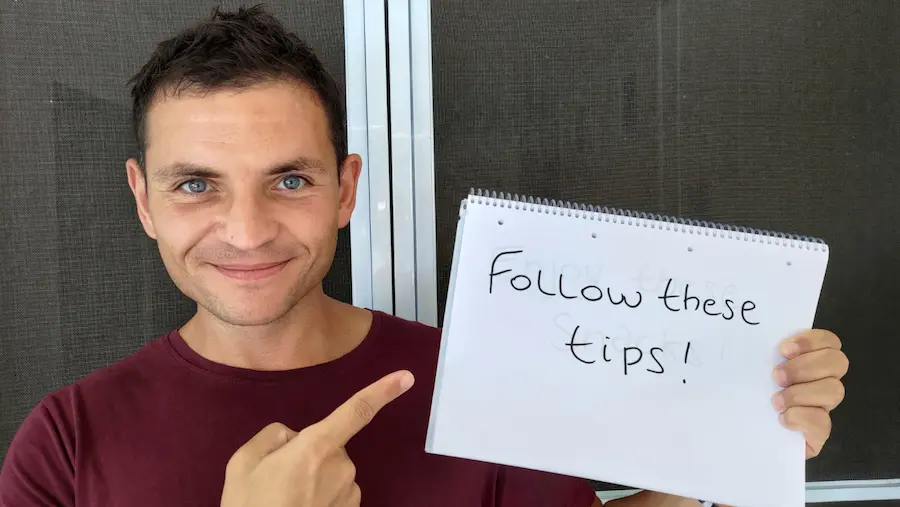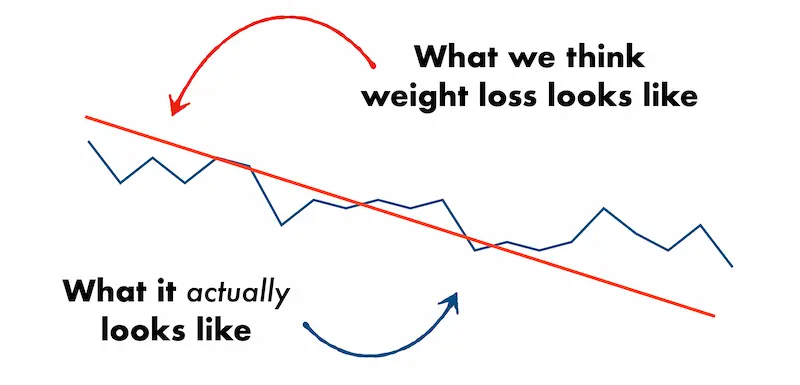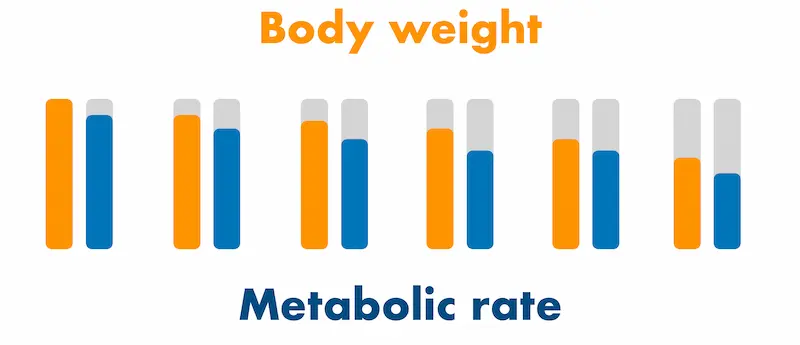Have you been following an Optavia program but hit a dreaded weight loss plateau?
I’ve experienced a weight loss plateau during my own Optavia journey. It was a frustrating period as I was no longer seeing the same rate of weight loss that I had previously.
Instead, my weight remained stagnant or only fluctuated slightly.
(So I know how you feel.)
However, I learned that weight loss plateaus are common and can happen to anyone, and it’s important to understand that they are a normal part of the process.
I want to share some tips and tricks that helped me break through my Optavia weight loss plateau.
This is not about detoxing. It’s not about skipping Fuelings or starving yourself.
None of that stuff.
I will outline things that can potentially cause the Optavia plateau and provide useful strategies on how to overcome them.

First, let’s talk about weight loss plateau
Experiencing a weight loss plateau is very common, and it can be frustrating to feel like you’re putting in the effort but not seeing results.
And if you’re on Optavia right now, it’s important to keep in mind that the weight loss process does not move in a straight line.
Here’s the graph that helps to illustrate the difference between the perception of weight loss and reality.

As you can see, it’s normal for weight loss goals to temporarily plateau.
And unlike many things that throw you out of Optavia fat burn, the weight loss plateau happens organically.
Gurpreet Sarwan, D.O. is a resident physician at the Nassau University Medical Center in East Meadow, NY.
In his article Management Of Weight Loss Plateau published in the Statpearls Journal, Dr. Sarwan explains that “weight change can be slow or even nonexistent for certain periods of time despite following an established calorie deficit plan.”
This is commonly referred to as “hitting a plateau”.
There are many theories about weight loss plateau
You may be wondering, why is my weight plateau on Optavia?
Weight loss plateaus can be frustrating and mysterious.
One popular theory is the “set point” theory.
The “set point” theory suggests that our weight is regulated by a communication loop between peripheral organs (like fat tissue) to the central nervous system in order to maintain balance throughout our body (1).
So how does it work?
The graph below helps to illustrate how the set point theory works.

On the top, you have body weight, and on the bottom metabolic rate.
As we lose more weight, our bodies adapt to the changes and become more efficient, which makes it more challenging to continue losing weight.
This is known as adaptive thermogenesis.
Even though weight loss plateaus can be discouraging, they are perfectly normal as part of the overall journey to reach your goals, states Dr. Sarwan.
But how long does it last?
“Everyone’s plateau length and situation is unique due to their body composition, diet choices, exercise routine, and metabolism,” Dr. Sarwan explains.
It could last anywhere from a few weeks up to several months.
How to identify the Optavia plateau?
Weight loss is not an instantaneous process, and it can be difficult to detect progress as the body does not provide immediate feedback.
It doesn’t work like that.
It may take several weeks to determine if you are making progress or not.
However, there are some strategies that helped me recognize when I hit a weight loss plateau while on the Optavia program.
Tracking my weight
When I was trying to lose weight on Optavia, I learned that tracking my weight consistently over time was crucial.
I used a scale with a body composition analyzer to monitor my weight and made sure to weigh myself consistently every week.
(It’s one of those fancy scales that measure body fat percentage.)
This wasn’t perfect becasue body weight can fluctuate between weekdays and weekends, especially during the holiday period.
But it gave me some insights into whether or not I was still making progress.
If I noticed that my weight had not decreased significantly over 3-4 weeks, it was a sign that I may have hit a plateau.
Your hunger may go up
During this period, research shows that people secrete higher amounts of the hunger-stimulating hormone ghrelin.
This leads to increased appetite alongside fatigue, which makes sustaining a diet difficult.
As you can imagine, going through a phase where you feel hungrier, more tired, and not losing weight can be exhausting both physically and emotionally.
So it’s no surprise that many people tend to give up their diet during this stage, and it’s not uncommon.
Take body measurements
Taking body measurements is an essential habit to stay motivated, and I believe it is the most crucial.
Now, why do I say so?
Unlike body weight, your body circumference can tell you a lot about your progress.
Paying attention to body measurements, such as waist circumference or body fat percentage, can also help identify a plateau.
If these measurements are not changing despite following the 5 and 1 plan to the letter, it may be time to switch things up.
How do you jump start and break a plateau on Optavia?
As I’ve told you already, I tried a bunch of things to break through the Optavia plateau.
I can’t say for sure which one thing was the most effective, but I’d recommend trying out as many as possible.
Here’s a list of things that helped me:
1. Move more
One of the simplest (and probably easiest) ways to break through a weight loss plateau is to add more movement to your daily routine.
Little things like taking the stairs instead of the elevator, or parking farther away from the entrance can also make a big difference in getting some extra steps in.
Instead of taking the car, why not walk or bike to your destination if it’s possible?
And if you’re already doing regular exercise, you can kick things up a notch by increasing the duration or intensity of your workouts.
2. Add strength training
Walking is great but you know one simple thing that made my results bullet-proof?
Strength training.
(Like lifting weights and stuff.)
No, this isn’t about bootcamp classes. It’s not about CrossFit.
It’s about doing 4-5 resistance training exercises (at home) that help build muscle mass.
And having more muscle can actually boost your metabolism and increase the number of calories you burn even when you’re not working out.
It may sound intimidating, but trust me, there’s no question it’ll be worth your time.
3. Reduce stress
Reducing stress was one of the first things I did to lose weight faster on Optavia.
I’ve noticed that when I’m stressed I have really bad sleep and I tend to eat more, which makes it much harder to lose weight.
So what I did do to reduce stress?
(Fair warning. This won’t be everyone’s cup of tea.)
Yoga and meditation.
There’s nothing flashy and there’s no cool “quick fix” behind stretching and breathing techniques.
But if you want to break through a plateau and you know your daily stress is standing in your way, I think you’ll be thrilled to try it.
4. Avoid alcohol
In my experience, removing alcohol from my Optavia diet was the most effective way to break through my weight loss plateau.
It’s not about the calories in the alcohol.
I noticed that when I drank, I tended to overeat and make unhealthy food choices.
By eliminating alcohol from my diet, I was able to reduce my overall caloric intake and improve my metabolism, ultimately helping me break through my plateau.
5. Avoid processed food
The last thing you want to do to break the Optavia plateau is to eat more processed foods.
What do I mean by that?
We know that processed food is bad.
We know that eating whole foods is better.
Avoid processed food it’s not about getting rid of Optavia Fuelings. It’s not about choosing alternatives from other processed foods.
It’s about choosing the nutrient-dense, whole foods for your lean and green meals that come from the ground and are minimally processed.
6. Use a food journal
I know that using a food journal might sound like a hassle, but hear me out!
By tracking your daily food intake, you can get a better sense of what you’re actually eating.
This can help you identify areas where you may be eating too many calories (or not getting enough of the right nutrients).
Now, you don’t need to write every calorie and ounce of food you put in your mouth.
It’s not like MyFitnessPal or NOOM app.
(Or whatever other app you’re using.)
It’s about capturing your meals as a whole as well as writing down your thoughts, feelings, and emotions that you have around meal time.
Here’s a real world example.
Let’s say you had a stressful day at work and you find yourself reaching for a bag of chips as soon as you get home.
If you take the time to write down your thoughts and emotions around that moment, you might discover that stress is a trigger for your unhealthy snacking habits.
By recognizing this trigger and writing it down, you can start to develop strategies to overcome it.
You get the picture.
7. Work with your Optavia coach
If you find yourself struggling with a weight loss plateau, working with your Optavia coach could be just what you need to push through it.
If you’re feeling discouraged or stuck, your coach can help you identify the root cause of your struggles and offer advice on how to overcome them.
Your coach can review your meal plan and make suggestions for adjustments or modifications.
Of course, we all know the story of Optavia coaches that are more focused on sales, rather than providing support and guidance.
And if that’s the case, find someone who is a good fit for you and your needs.
The bottom line
While breaching through the Optavia plateau is no easy task, if you try the tips mentioned above, it may increase your chances for further progress.
You can find more tips on how to lose weight faster on Optavia that could assist you greatly during this process.
Reference
- Müller, M. J., Bosy-Westphal, A., & Heymsfield, S. B. (2010). Is there evidence for a set point that regulates human body weight? F1000 Medicine Reports, 2. https://doi.org/10.3410/M2-59
